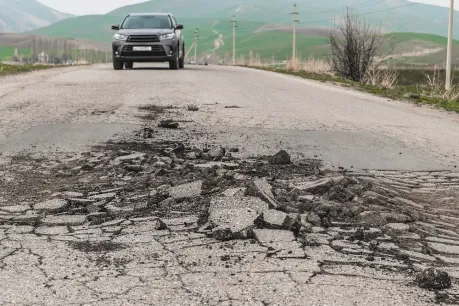Heatwave Hazards: Understanding Your Rights When Roads Buckle

Injured?
Extreme heatwaves are becoming more common and increasingly dangerous. As temperatures soar across the country, the risk of roads buckling under the pressure is no longer a rare event. Highways, interstates, and city streets are cracking open, creating hazardous conditions for unsuspecting drivers.
When the pavement breaks, so can your sense of safety. And if you or someone you love has been injured because of roadway damage caused by heat, you may be wondering: Who’s responsible? And what are my legal options?
Why Do Roads Buckle in Extreme Heat?
Concrete and asphalt expand in hot weather. When temperatures climb well above average, especially during a rapid heatwave, road surfaces can no longer handle the stress. The materials swell, shift, and eventually crack. In severe cases, entire slabs of concrete heave upward, forming sudden and dangerous obstacles.
These buckles, also called “blowups,” are especially common on older roads or poorly maintained infrastructure. They don’t always give a warning, and some can develop within hours.
The Real-World Danger
A buckled road isn’t just inconvenient. It’s a serious safety risk. Drivers who hit unexpected raised pavement or ruptured surfaces at full speed can experience:
- Loss of vehicle control
- Tire blowouts
- Airbag deployment
- Undercarriage or suspension damage
- Rollover accidents
- Rear-end collisions from sudden braking
Motorcyclists and cyclists are at even greater risk of serious injury if they hit one of these irregularities, especially on highways where reaction time is minimal. In some parts of the U.S., dozens of accidents have been linked to heat-related road failures each summer, and in rare cases, fatalities have occurred.
Who’s Responsible for Heat-Related Road Damage?
In many cases, roads are maintained by city, county, or state transportation departments. These agencies are responsible for:
- Regular inspection and maintenance
- Emergency repairs
- Posting clear warnings or detours when hazards arise
If a government entity failed to properly monitor infrastructure, respond to heat warnings, or warn drivers of known dangers, it may be liable. However, like most personal injury cases, the outcome depends on the specific details of the case.
It’s also possible that third-party contractors, construction companies, or even private property owners could share responsibility if the incident occurred on a privately managed road or if shoddy construction contributed to the road’s failure.
What If You Were Injured?
If you were injured in a crash caused by buckled pavement or roadway failure, you might be eligible for compensation, but these claims can be complex. Suing a government agency involves a different legal process than suing a private party. In many states, the window for filing a claim against a government entity is significantly shorter than that for a standard personal injury case.
You may be able to recover damages for:
- Medical bills
- Vehicle repair or replacement
- Lost wages
- Pain and suffering
- Long-term rehabilitation or therapy
- Emotional distress
The key is proving that negligence played a role in the incident. In other words, could the responsible party have reasonably prevented the harm and failed to act?
This is where experienced attorneys come in. They can investigate maintenance records, weather reports, prior complaints, and accident reports to build your case.
How to Protect Yourself (and Your Case)
Here’s what to do if you’re involved in an accident related to road buckling or pavement failure:
- Call 911 immediately. Your safety and the safety of others are the top priority.
- Document the scene. If it’s safe to do so, take photos of the damage, your vehicle, injuries, and the roadway.
- Seek medical attention. Even if you feel okay, get checked out. Some injuries take time to appear.
- Report the condition. Filing a report with local authorities helps establish a paper trail.
- Contact a lawyer. These cases often involve government claims or shared liability, so it’s best not to navigate them alone.
What About Insurance?
Depending on the details, your auto insurance may or may not cover roadway damage or related injuries. Many policies exclude “acts of God” like weather-related incidents, but if negligence is a factor, there’s a legal pathway for recovery that goes beyond insurance.
Keep in mind: your insurer might try to shift blame, especially if there's no official record of the road’s condition at the time of the crash. The sooner you document the scene and get legal insight, the stronger your claim can be.
Summer Roads Are Unpredictable; Your Legal Support Shouldn’t Be
When roads buckle under pressure, so do the systems that are supposed to keep us safe. Heatwaves are becoming more frequent, but that doesn’t mean drivers should bear the burden when the pavement fails.
If you’ve been injured or suffered property damage due to road buckling, know this: you have rights, and you don’t have to navigate this alone.
Morgan & Morgan is here to fight for people, not the powerful. Our legal team can review your case, investigate the conditions that caused your crash, and help you pursue the compensation you may be owed. Contact us today for a free, no-obligation case evaluation. We’re here when the road gets rough.

We've got your back
Injured?
Not sure what to do next?
We'll guide you through everything you need to know.

